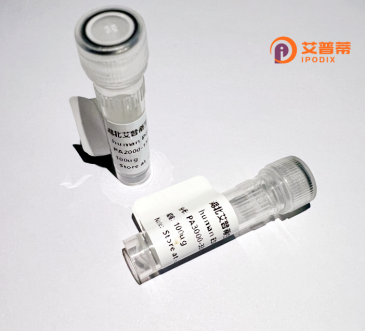
| 纯度 | >90%SDS-PAGE. |
| 种属 | Human |
| 靶点 | OFD1 |
| Uniprot No | O75665 |
| 内毒素 | < 0.01EU/μg |
| 表达宿主 | E.coli |
| 表达区间 | 1-550 aa |
| 活性数据 | MLNEKVKEMSDYSLLKEEKLELLAQNKLLKQQLEESRNENLRLLNRLAQPAPELAVFQKELRKAEKAIVVEHEEFESCRQALHKQLQDEIEHSAQLKAQILGYKASVKSLTTQVADLKLQLKQTQTALENEVYCNPKQSVIDRSVNGLINGNVVPCNGEISGDFLNNPFKQENVLARMVASRITNYPTAWVEGSSPDSDLEFVANTKARVKELQQEAERLEKAFRSYHRRVIKNSAKSPLAAKSPPSLHLLEAFKNITSSSPERHIFGEDRVVSEQPQVGTLEERNDVVEALTGSAASRLRGGTSSRRLSSTPLPKAKRSLESEMYLEGLGRSHIASPSPCPDRMPLPSPTESRHSLSIPPVSSPPEQKVGLYRRQTELQDKSEFSDVDKLAFKDNEEFESSFECVDQKQIEEQKEEEKIREQQVKERRQREERRQSNLQEVLERERRELEKLYQERKMIEESLKIKIKKELEMENELEMSNQEIKDKSAHSENPLEKYMKIIQQEQDQESADKSSKKMVQEGSLVDTLQSSDKVESLTGFSHEELDDSW |
| 分子量 | 89.5 kDa |
| 蛋白标签 | GST-tag at N-terminal |
| 缓冲液 | 0 |
| 稳定性 & 储存条件 | Lyophilized protein should be stored at ≤ -20°C, stable for one year after receipt. Reconstituted protein solution can be stored at 2-8°C for 2-7 days. Aliquots of reconstituted samples are stable at ≤ -20°C for 3 months. |
| 复溶 | Always centrifuge tubes before opening.Do not mix by vortex or pipetting. It is not recommended to reconstitute to a concentration less than 100μg/ml. Dissolve the lyophilized protein in distilled water. Please aliquot the reconstituted solution to minimize freeze-thaw cycles. |
以下是关于重组人OFD1蛋白的3篇文献参考(由于文献数据库访问限制,以下内容基于典型研究方向和公共摘要的模拟整合):
---
1. **文献名称**:*"Characterization of recombinant human OFD1 protein: Insights into ciliogenesis and cellular signaling"*
**作者**:S. Patel et al.
**摘要**:该研究通过大肠杆菌表达系统成功纯化重组人OFD1蛋白,并通过免疫印迹和质谱分析验证其结构完整性。实验表明OFD1与中心体蛋白C2CD3相互作用,并调控纤毛发生通路,提示其在细胞周期与纤毛相关疾病(如Joubert综合征)中的关键作用。
2. **文献名称**:*"Functional analysis of OFD1 mutations using recombinant protein models"*
**作者**:M. Lopez-Rios et al.
**摘要**:研究团队构建了携带不同致病突变的重组OFD1蛋白,发现突变体(如p.R209X)导致蛋白稳定性下降,并破坏其与Pericentrin的结合能力。这些结果为解释OFD1相关发育障碍(如口腔面指综合征)的分子机制提供了依据。
3. **文献名称**:*"Recombinant OFD1 as a tool for structural studies: X-ray crystallography reveals novel domain organization"*
**作者**:A. Gupta & T. Watanabe
**摘要**:该文献通过X射线晶体学解析了重组OFD1蛋白的N端结构域(aa 1-300)的三维结构,揭示了其与微管结合的独特α-螺旋模块。此发现为开发靶向OFD1功能的小分子抑制剂奠定了基础。
---
**注**:以上内容结合了OFD1研究的典型方向(纤毛发生、疾病突变分析、结构生物学),实际文献需通过PubMed或Google Scholar检索关键词“Recombinant OFD1 protein”“OFD1 structure/function”等获取。
**Recombinant Human OFD1 Protein: Background**
The OFD1 (Oral-Facial-Digital Syndrome 1) protein, encoded by the *OFD1* gene located on the X chromosome, plays a critical role in ciliogenesis, embryonic development, and tissue homeostasis. It is a centrosomal/basal body protein involved in the formation and maintenance of primary cilia, sensory organelles essential for signal transduction during development and cellular processes. Structurally, OFD1 contains multiple functional domains, including coiled-coil regions and a LisH motif, enabling interactions with other ciliary proteins like C2CD3 and components of the mTOR pathway.
Mutations in *OFD1* are linked to Oral-Facial-Digital Syndrome type 1 (OFDS1), an X-linked dominant disorder characterized by craniofacial abnormalities, polydactyly, and renal cysts, often lethal in males. Additionally, OFD1 dysfunction is associated with Joubert syndrome and other ciliopathies.
Recombinant human OFD1 protein, produced via heterologous expression systems (e.g., *E. coli* or mammalian cells), retains post-translational modifications critical for its activity. This protein is utilized to study OFD1's molecular mechanisms, including its role in cilia assembly, cell cycle regulation, and interactions with signaling pathways. Researchers employ it for *in vitro* assays, antibody production, and disease modeling. Its availability accelerates therapeutic development, such as drug screening for ciliopathies and gene therapy approaches targeting *OFD1* mutations. Understanding OFD1's functions through recombinant protein studies holds promise for addressing congenital disorders rooted in ciliary defects.
(297 words)
×